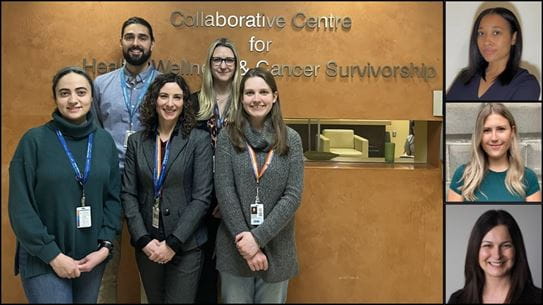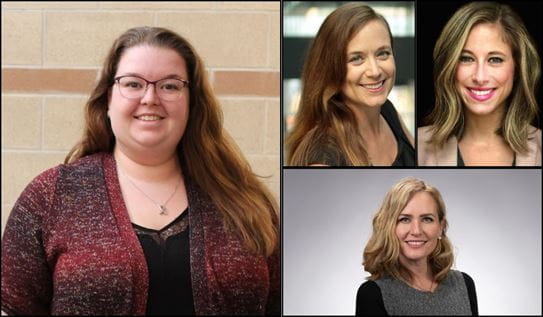Adolescents and young adults (AYAs) aged 15-39 make up about 30% of the population of Canada. When it comes to a cancer diagnosis, treatment and recovery, this group has unique needs that are influenced by the fact that they are at varying stages of development in their lives. Cancer can significantly disrupt their education, relationships and ambitions of career or parenthood.
For AYAs with cancer and their loved ones, it can be difficult to access care and support adapted to their needs. The Canadian Cancer Society (CCS) is proud to fund a wide range of research projects focused on improving the cancer experience for AYAs with cancer in Canada. Below are 5 examples:
Connecting and empowering young adult cancer survivors
Dr Jackie Bender knows that AYAs navigating the healthcare system can feel isolated and overwhelmed. That’s why she and her team are using a CCS Challenge grant to design a program that uses a digital app to connect AYAs with other young adult cancer survivors or peer navigators who can help guide them through the health system.
The project involves training peer navigators to provide relevant information and support to other AYAs with cancer and help them meet their needs.
“Our research has shown that young adults want easily accessible navigation services provided by young adult cancer survivors who understand what it’s like and are trained to help them get the support they need,” Dr Bender at the University Health Network says. “We are grateful to the inaugural cohort of young adults who have volunteered to be peer navigators in our digital peer navigation program and to CCS for the funding to implement and evaluate the program.”
A peer navigator in Dr Bender's project describes the special connection and understanding between people who have experienced the same thing: “All I wanted, when I was first diagnosed, was to talk to someone who had been through what I was going through,” they say. “I'd like to be that person and help guide someone else through it.”

Why are some bone cancers resistant to therapy?
Some types of cancer, including blood cancers like leukemia and solid cancers of the brain, bone or connective tissue, are more prevalent in young people than in adults. Even after going through treatments like chemotherapy, some people experience relapse, and their cancer cells may spread to other parts of the body.
With a CCS Challenge grant and support from the Cole Foundation, Livia Garzia, PhD, at McGill University is conducting research to understand how bone cancers in AYAs develop resistance to chemotherapy in order to improve treatment strategies. Osteosarcoma is the most common type of bone cancer found in children and young adults, and most people with this cancer are treated with chemotherapy and surgery.
The research team believes that some cells within osteosarcomas may have greater resistance to chemotherapy due to their genetic makeup. Using tumour samples donated by individuals, the team will use advanced techniques to identify molecular changes that affect how cancer responds to chemotherapy.
"By comparing the samples from before and after treatment from the same individuals, we will be able to obtain crucial information about the mechanisms of resistance to chemotherapy," Garzia says. “We hope these efforts will lead to a better understanding of cancer relapse in AYAs and help us develop more efficient and effective treatments.”
.jpg?h=507&iar=0&mw=543&w=543&rev=3347d7a7b98f4706bc572860c30c564b&hash=F4CB03655697ADD8EBF6EDEAF7EC90E3)
Finding better strategies to control vaping
The relatively recent introduction of e-cigarettes and their growing popularity among AYAs have added new challenges to the tobacco control landscape. Dr Laura Struik, an expert in nicotine use in youth, is providing critical evidence to guide the development and implementation of a new tobacco control strategy focused on vaping. These findings are being driven by strong youth engagement.
With a CCS Emerging Scholar award, Dr Struik at the University of British Columbia is working to understand e-cigarette use among diverse populations with the goal of enhancing prevention and policy measures around youth vaping and modernizing smoking cessation programs to include vaping.
"No one has the perspective of what it's like to be a youth or young adult today except for young people themselves,” Dr Struik says. “It is my hope that, by engaging young people as core members of the research team, the cancer prevention efforts we generate will resonate with this population and empower them to be drivers of their own health and well-being."
The team is working directly with key stakeholders, including young people, Indigenous communities, health authorities and educators to ensure that their experiences and perspectives are incorporated throughout the research process.
.jpg?h=306&iar=0&mw=543&w=543&rev=7ab55b1e1008421a95d981ab4657f076&hash=99679684D0E1CACA463D42EE659EC7F2)
Understanding the transition to palliative care for AYAs
AYAs fall between pediatric and adult healthcare systems — 2 systems designed for people with cancer much younger and older than they are. More research is needed to identify how AYAs experience palliative care and how we can best provide age-appropriate care.
With a CCS Research Training award, Emily Drake, a PhD candidate at Dalhousie University, is exploring how AYAs living with advanced cancer experience the transition to palliative care.
"While there exists limited information on AYAs and cancer, there is even less evidence available concerning those living with an advanced illness,” Drake says. “More research is needed to better understand their access to and experience with palliative care."
Recruiting participants from hospitals, national programs and through social media, Drake's team will investigate how AYAs living with advanced cancer experience palliative care conversations with healthcare providers. This project will provide some of the information necessary for those who provide care for these young people in Canada.
.jpg?h=493&iar=0&mw=543&w=543&rev=0c798dc317c34d7eb29ba12c469df44f&hash=D621732A8CD276E38B39F52AC69EC710)
"I am a survivor" - Examining the impacts of cancer labels in AYAs
Words like "survivor" or “fighter” are often used to describe people who have had cancer, but we don't know if these words can affect how AYA's see themselves or their emotional well-being. Michaela Bourque, a PhD student at the University of Manitoba, is leading a team to change that.
With a CCS Research Training award, Bourque will study how words like “survivor” or “fighter” may impact young people’s mental health and identity. Her team will follow a small group of young people over time as they go through their cancer experience. They will ask them about their experience to show any changes in self-identity and mental health as they happen along the way.
“It is important for everyone to know how words impact people with cancer and survivors,” Bourque says. “The tools we create will act as a guide for people to better understand the impacts of cancer-related language on young adults’ experiencing cancer.”
Bourque hopes the results from this study will bring about changes in the healthcare system to help make sure that young people with cancer get the best care that is specific to their needs.

To learn more about how CCS-funded research aims to advance equitable access to cancer care and prevention for adolescents and young adults and other underserved groups, check out our research strategy.
